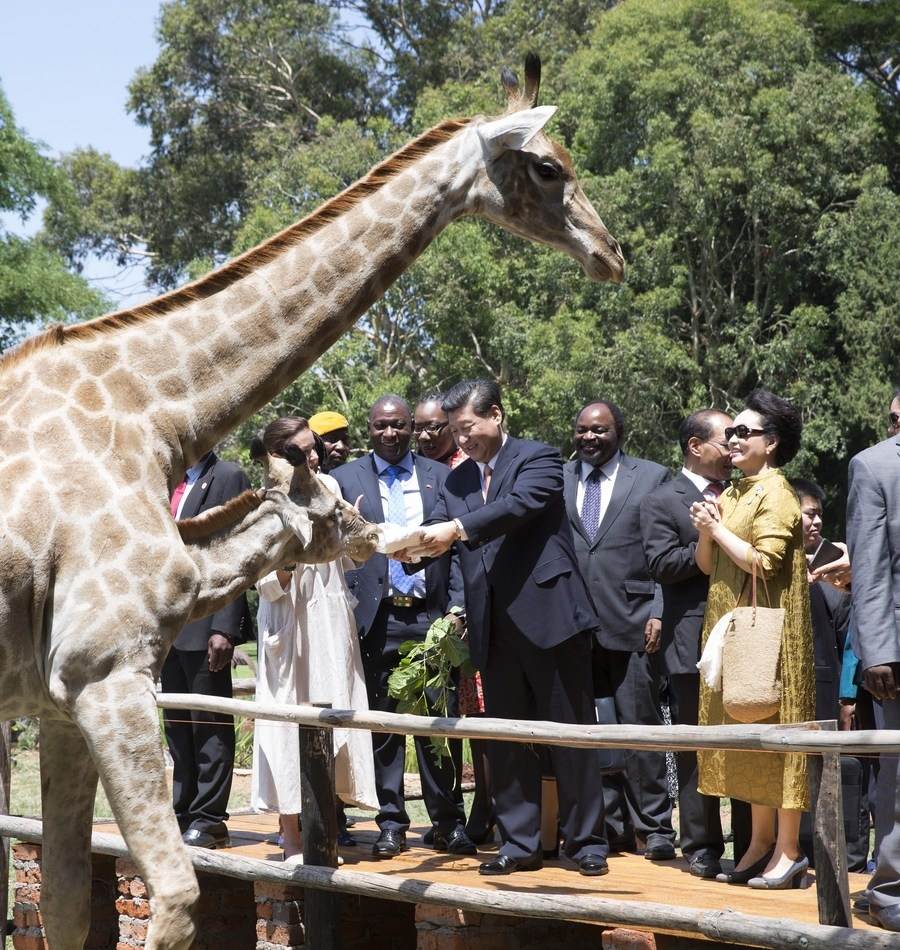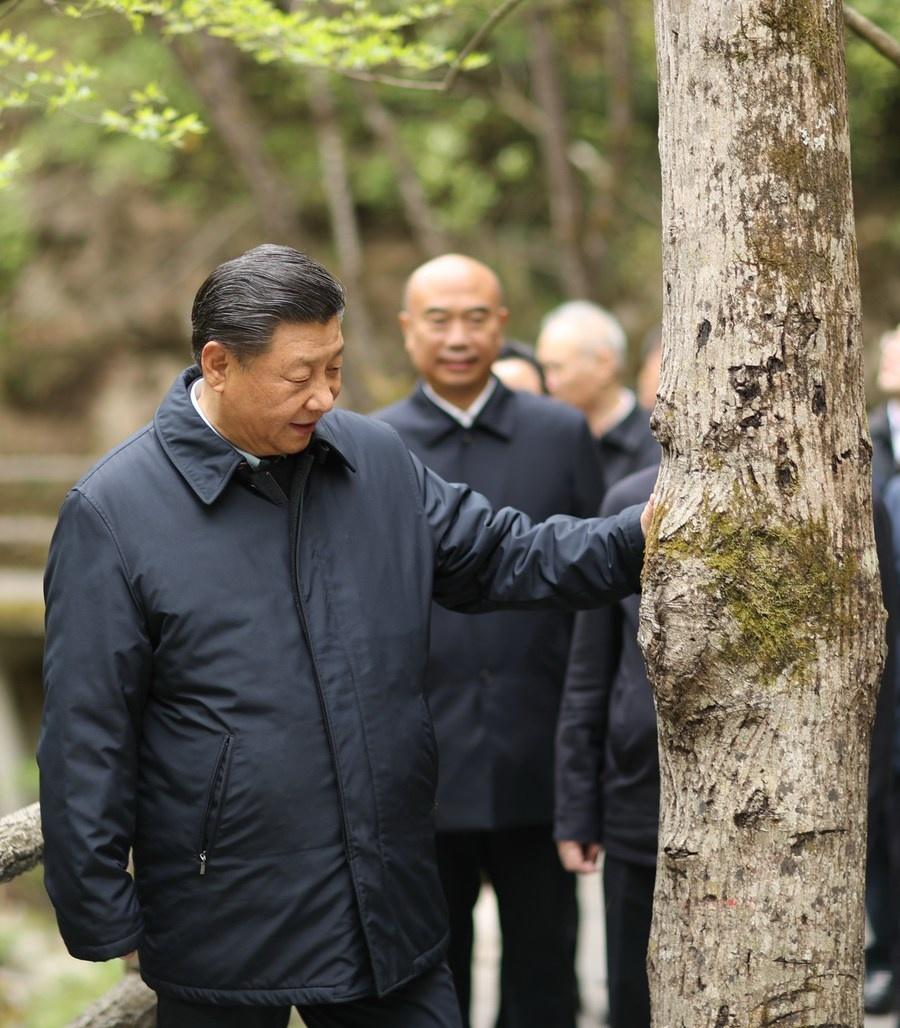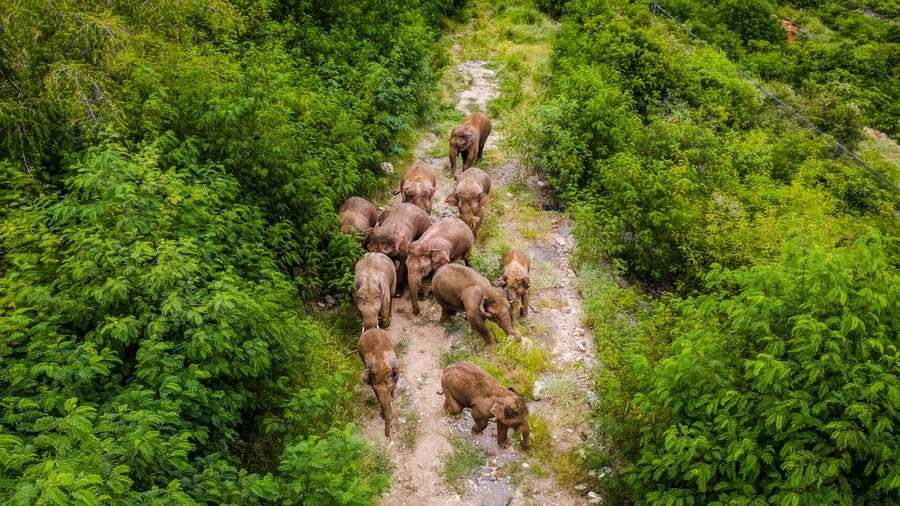A president's passion for wildlife, biodiversity

Chinese President Xi Jinping visits a section of the Lijiang River and learns about local efforts in the ecological conservation of the river in Yangshuo, south China's Guangxi Zhuang Autonomous Region, April 25, 2021. (Xinhua/Ju Peng)
BEIJING, Oct. 11 (Xinhua) -- The runaway success story of the summer was the more than 110-day adventure of a herd of 14 wandering wild Asian elephants across Yunnan Province, southwest China. The herd's sojourn gripped the nation and beyond, making the elephants social media superstars. Beyond the headlines, however, this is a story of conservation, commitment, and care that spans decades.

Chinese President Xi Jinping (C, front) and his wife Peng Liyuan visit a wildlife sanctuary in Harare, Zimbabwe, Dec. 2, 2015. (Xinhua/Lan Hongguang)
In December 2015, during a state visit to Zimbabwe, Chinese President Xi Jinping reflected on the remarkable progress by China to protect wildlife, natural habitats and end the illegal trade of wild animals and animal products, including ivory.

Chinese President Xi Jinping and his wife Peng Liyuan visit a wildlife sanctuary in Harare, Zimbabwe, Dec. 2, 2015. (Xinhua/Huang Jingwen)
The remarks were not made on a whim.
Xi didn't just tell people to protect the environment and local wildlife; he led by example.
In 1997, when Xi was a local official in Fujian, he was inspecting a river that runs through one of the province's counties when a carp leaped out of the water onto his raft. "Now we have an additional ingredient for tonight's dinner," rafter Xiao Kewen joked. Xi, however, smiled and removed one of the covers on his boots, filled it with water, and placed the fish inside. When the raft arrived in calmer water, he released it back into the river.
Almost twenty years later in December 2016, China declared that the country would end the domestic ivory trade within a year. True to its word, on Jan. 1, 2018, a nationwide ban on the ivory trade for commercial purposes came into force.

Chinese President Xi Jinping learns about ecological conservation of the Qinling Mountains at Niubeiliang National Nature Reserve, northwest China's Shaanxi Province, April 20, 2020.(Xinhua/Ju Peng)
In November 2020, when addressing the G20 Riyadh Summit via video link, Xi took this initiative another step forward and called for a complete ban on the illegal wildlife trade.
Environmental protection and restoration efforts have not only benefited elephants and aquatic species: populations of wild animals across the nation have increased. Earlier this year, giant pandas were downgraded from "endangered" to "vulnerable." The Tibetan antelope went from "endangered" to "near threatened."
During this year's epic elephant expedition, hundreds of thousands of locals were evacuated, but they showed great patience and tolerance. "The elephants look so at ease -- the sky is the roof, the earth is the bed, and everywhere can be home," netizens commented on photos and videos of the herd on social media.

Aerial photo taken on Aug. 9, 2021 shows a herd of wild Asian elephants in Yuanjiang County of Yuxi City, southwest China's Yunnan Province. (Xinhua/Hu Chao)
China's conservation, commitment, and care for wildlife and the environment represent just one way it aims to ensure our shared home is welcoming and comfortable for generations to come.
The 15th meeting of the Conference of the Parties to the UN Convention on Biological Diversity, known as COP15, kicked off on Monday afternoon in Kunming, capital of Yunnan Province.
Photos
Related Stories
- Commentary: The world awaits ambitious roadmap for stronger biodiversity protection
- Xi extends condolences to Putin over plane crash
- Finding amazing wildlife in China
- Rare plants in Kunming Botanical Garden, SW China
- Interview: Danish minister calls for ambition, global cooperation to fight decline in biodiversity
Copyright © 2021 People's Daily Online. All Rights Reserved.










